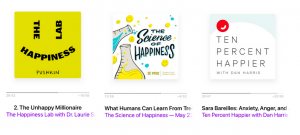Resilience is defined by positive adaptation, or the ability to maintain or regain mental health, despite experiencing adversity. (Hermann, 2011). It consists of effective coping and the ability to adapt and recover from the negative consequences of stress on health and wellbeing (Bonanno, 2004; Masten, 2007; Skodol, 2010, Tugade, 2011). Common markers of resilience are self-compassion, gratitude, growth mindset, and flexible grit.
I spent this summer researching resilience with Professor Tugade and fellow psychology student Lila Malin. We spent most of our time gathering data from existing positive psychology podcasts, webinars, and online lecture series. I focused on three podcasts: Happiness Lab, The Science of Happiness, and Ten Percent Happier. I also watched several sessions from the Wisdom for Life seminar series.
These happiness podcasts served as our inspiration
While researching the podcasts and webinars, we took notes on format, content, and demographics. Based on those assessments, we considered 1) what was missing from existing podcasts and 2) what we could add to the world of positive psychology content.
We developed an outline with some key topics and questions for our prospective podcast/webinar series. Using the outline, we conducted a couple of sample interviews, focusing on the effects of COVID-19 on various communities. I interviewed a friend on her experience navigating COVID within the theater and performing arts scene in New Orleans.
A sample interview I conducted
To me, this project highlighted the importance of resilience in our current times. In researching resilience stories, we discovered just how important it is to develop resilience strategies as habits. With regular practice, something as simple as identifying one thing for which you’re grateful can improve your mental health and happiness tremendously.


